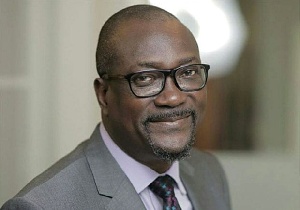- Home - News
- Elections 2024
- News Archive
- Crime & Punishment
- Politics
- Regional
- Editorial
- Health
- Ghanaians Abroad
- Tabloid
- Africa
- Religion
- Photo Archives
- Press Release
Politics of Monday, 12 May 2025
Source: www.ghanawebbers.com
Prof. H. Kwasi Prempeh urges government to amend the Code of Conduct to regulate display of ostentation by appointees
Prof. H. Kwasi Prempeh, Chairman of the Constitution Amendment Committee, has made a call to the government. He urges an urgent amendment to the code of conduct for public officials. This amendment should specifically regulate public acts of charity and displays of wealth.
He proposes banning public officers from setting up "private" foundations. He emphasizes that high-ranking officials must be accountable for their lifestyle and spending in public. The new Code should aim to improve public ethics on multiple levels.
His comments follow a viral video featuring Sammy Gyamfi, acting CEO of the Gold Board. In the video, Gyamfi is seen giving dollar bills to Nana Agradaa. This act has drawn significant criticism from party members and opposition figures.
Realizing his mistake, Gyamfi apologized to Ghanaians. He claimed he was merely helping someone in need.
Gyamfi's actions highlight a common issue among politicians regarding gift-giving. Politicians often give gifts publicly while hiding private ones due to potential bribery concerns. Public gifts are rarely questioned, especially when given for worthy causes like medical treatment or education.
However, this acceptance raises questions about how these officials afford such generosity on a public salary. Some even establish foundations to promote their charitable acts, despite limited known income sources.
Critics who question these displays are often dismissed as meddling or envious. This attitude reflects a double standard in our approach to corruption; we condemn gift-taking but overlook extravagant gift-giving by officials.
To combat corruption effectively, both sides—receiving and giving—must be regulated equally. Lifestyle audits and unexplained wealth laws are becoming popular tools against corruption worldwide.
The backlash against Gyamfi's video suggests changing attitudes toward ostentatious gifting by public servants. However, it raises questions about whether reactions depend on the recipient's identity rather than the act itself.
The current Executive branch Code of Conduct only addresses receiving gifts but neglects public gifting by salaried officials. This oversight aligns with our general acceptance of such practices among them.
While charity is important, unregulated public gifting can raise suspicions about funding sources and hinder anti-corruption efforts. Therefore, the Code must be amended to address these issues directly and include a ban on private foundations for public officers.
In summary, once individuals accept high office, they must be accountable for their conduct in all aspects—including lifestyle choices displayed publicly. The new Code should strive to enhance our ethical standards across various fronts.











